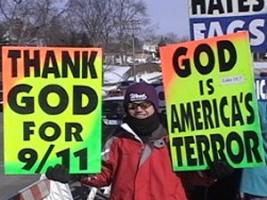 Freedom of speech can be ugly. Minnesotans saw that firsthand in February 2006, when Andrew Kemple was laid to rest in Anoka after he was killed in Iraq. “Parisioners” from the Westboro Baptist Church in Topeka picketed the funeral, saying homosexuality is a sin that God punishes by killing Americans, especially American soldiers. Rev. Fred Phelps contends when a soldier is killed, it’s God’s retaliation for America’s views on homosexuality.
Freedom of speech can be ugly. Minnesotans saw that firsthand in February 2006, when Andrew Kemple was laid to rest in Anoka after he was killed in Iraq. “Parisioners” from the Westboro Baptist Church in Topeka picketed the funeral, saying homosexuality is a sin that God punishes by killing Americans, especially American soldiers. Rev. Fred Phelps contends when a soldier is killed, it’s God’s retaliation for America’s views on homosexuality.
Missouri passed restrictions on the protests, creating buffer zones between demonstrators and funerals and processions, and banning protests an hour before and an hour after the funeral service.
On Monday, the U.S. Supreme Court, perhaps biting its collective lip, refused to reconsider a lower court’s ruling that prevented Missouri from enforcing its law.
Following the lead of more than two dozen other states, Minnesota’s lawmakers pushed a similar bill through the 2006 Legislature after the Anoka funeral. The Senate vote passing the restrictions would’ve been unanimous, had it not been for the lone voice of the mother of a soldier killed in Iraq.
“We can say whatever we want to say, no matter how ugly, and we don’t get thrown in jail,” then Sen. Becky Lourey said.
The Legislature eventually passed a modified bill designed to answer the First Amendment challenges by making it a crime to “disrupt” a funeral, but it still comes close to the Kansas legislation, although it has not been tested.
Whoever does any of the following is guilty of a misdemeanor: (1) intentionally disrupts a funeral ceremony, a graveside service, or a memorial service, by publicly protesting or picketing during the period in which the ceremony or service is occurring, within the hour immediately preceding its commencement, or within the hour immediately following its completion; (2) with intent to disrupt a funeral procession, impedes or attempts to impede a vehicle that is part of the procession; (3) intentionally physically blocks or attempts to physically block access to a funeral ceremony, graveside service, or memorial service; or (4) knowingly engages in targeted residential picketing at the home or domicile of any surviving member of the deceased person’s family or household on the date of the funeral ceremony, graveside service, or memorial service.(b) Whoever is convicted of a violation of paragraph (a) following a previous conviction for a violation of paragraph (a) or a similar statute from another state or the United States is guilty of a gross misdemeanor.
The Minnesota bill was authored by Rep. Steve Smith, R-Mound, who could not be reached for comment. His mother passed away over the weekend.
But private citizens figured out their own way to prevent the protest. The Minnesota Patriot Guard — a group of motorcyclists — shields families of fallen soldiers from the Topeka protesters.
Minnesotans will get a chance to see Phelps’ followers in action later this week. On Thursday, they’ll picket the Norwegian consulate, Catholic churches, and Jewish temples.
